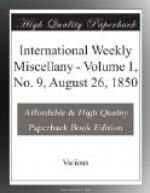Admirals and generals are numerous and conspicuous. Drake, Blake, Rodney, Jervis, Nelson, Collingwood; the subduer of Algiers beaten down for the French to occupy: and the defender of Acre, the first who defeated, discomfited, routed, broke, and threw into shameful flight, Bonaparte. Our generals are Marlborough, Peterborough, Wellington, and that successor to his fame in India, who established the empire that was falling from us, who achieved in a few days two arduous victories, who never failed in any enterprise, who accomplished the most difficult with the smallest expenditure of blood, who corrected the disorders of the military, who gave the soldier an example of temperance, the civilian of simplicity and frugality, and whose sole (but exceedingly great) reward, was the approbation of our greatest man.
With these come the statesmen of the Commonwealth, the students of Bacon, the readers of Philip Sidney, the companions of Algernon, the precursors of Locke and Newton. Opposite to them are Chaucer, Spenser, Shakspeare, Milton; lower in dignity, Dryden, Pope, Gray, Goldsmith, Cowper, Scott, Burns, Shelley, Southey, Byron, Wordsworth; the author of Hohenlinden and the Battle of the Baltic; and the glorious woman who equaled these, two animated works in her Ivan and Casabianca. Historians have but recently risen up among us: and long be it before, by command of Parliament, the chisel grates on the brow of a Napier, a Grote, and Macaulay!
WALTER SAVAGE LANDOR.
* * * * *
[FROM THE SPECTATOR.]
JURISPRUDENCE OF THE MOGULS: THE PANDECTS OF AURUNGZEBE.[4]
THE Government of British India have not neglected to countenance the study of the indigenous and other systems of law which they found established on acquiring possession of the country. Warren Hastings was the first to recognize the value of such knowledge; and to his encouragement, if not to his incitement, we are indebted for the compilation of Hindoo law translated by Halbed, Jones, Colebrooke, Macnaghten, Hamilton, and a pretty numerous body of accomplished men, of whom Mr. Baillie is the most recently enrolled laborer in the vineyard, have carried on the good work. More comprehensive and accurate views of Hindoo law have gradually been developed, and the more advanced and more influential system of Mahometan jurisprudence has also shared in the attention of European students. There is, however, still much to be done in this field of inquiry; as a few remarks on the nature of the present publication, and the source whence its materials are derived, will show.
[Footnote 4: The Moohummadan Law of Sale, according to the Hunefeea Code: from the Futawa Alumgeeree, a Digest of the whole Law, prepared by command of the Emperor Aurungzebe Alumgeer. Selected and translated from the original Arabic, with an Introduction and explanatory Notes, by Neil B.E. Baillie, Author of “The Moohummadan Law of inheritance.” Published by Smith and Elder.]




